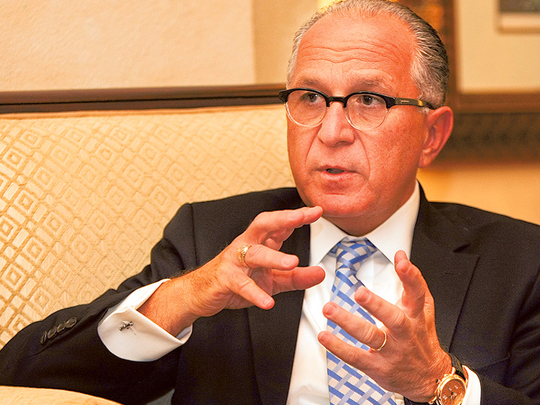
Dubai: General Electric (GE) is involved in innovative solutions to address the regional needs taking advantage of the changes of the global disruptive trends forces — the Industrial internet, Advanced Manufacturing and the Global Brain — and partnering with organisations and invest into small companies to promote entrepreneurship and incubate ideas through innovation centres, according to GE’s top executive.
For example, General Electric would be helping through investment in a company that would be helping in application of addressing the water problems in the region, which has little or no rivers, Nabil A. Habayeb, president and the CEO of GE Middle East, North Africa & Turkey (MENAT), told Gulf News in an interview on Wednesday, without divulging details.
In Algeria, the I.D.E.A. initiative (Industrie et Développement de l’Entreprenariat en Algérie), launched by Sonelgaz and GE, completed Phase 1 to contribute local innovation in the energy-sector supply chain and foster talent for industrial jobs. In Turkey, the GE Turkey Innovation Challenge brought energy efficiency and health care services to the attention of entrepreneurs across the region.
“Everyone thinks that this part of the world is just an oil and gas producing region, but there is more to this region than just oil and gas. The leaders of this region think that oil and gas important and a great natural resource and it will make things a lot more easier, but there are other things which are important on people’s mind, one is stability and second is efficiency of the health care, financial, education systems and third is sustainability in terms of food, energy and water,” he said.
Explaining further, Habayeb said: “One leader told me that today we have millions of people in my country I’ve a lot of gas, no rivers, but I can take the gas and desalinate water and give it to my people. In 25 years when I’ll run out of gas, I’ll still won’t have rivers. How am I going to provide water to people, when my population will quadruple by then. And the fourth thing is capabilities i.e. how do you create jobs and the skill sets for young population and are they ready for these skill sets.”
“We think of this region as all of these key themes we can address and help it grow. On of this the fact that we have disruptive forces going on this region like advanced manufacturing and 3D printing and how do you tap into this global brain,” he added.
GE works closely with the government and universities and collaborates with innovation centers for that. GE has partnered with more than 25 universities and educational organisations across the region to support talent growth and development. The new partnership with Wamda will further accelerate close governmental, industry and academic linkages.
“If we take a look at industrial internet, internet of things and crowd sourcing, there is going to be a lot of collaboration. And if you are not going to be a part of it then you’ll be left out,” Habayeb said.
Commercial innovation
“What we need is innovative ideas that can be commercialised. We have a lot of projects that are focused on water, fuel, energy efficiency and wind power and working on energy security, health care efficiency are the kinds of things we are working on,” Habayeb said.
The company is involved in about $14 billion of orders across the MENAT region, contributing to 14-15 per cent of company’s industrial revenues, and Habayeb said the outlook for its regional business is “positive”.
“We provide solutions through technology to address the solutions to power, oil and gas or water or health care etc,” he said, adding: “Our young population needs to ready from all this disruptive forces to address regional work, so are they ready from skill set in education and industrial growth while tapping into industrial internet, analytics and advanced manufacturing work.”












